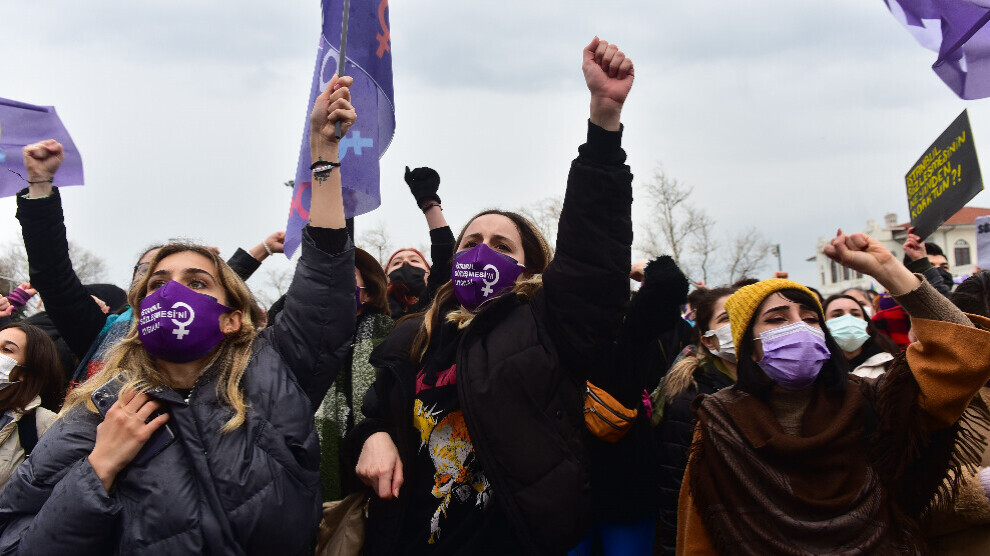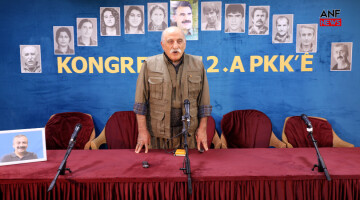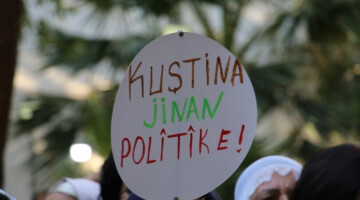As 25 November, the International Day for the Elimination of Violence against Women, approaches, violence against women in Turkey and Northern Kurdistan is increasing day by day. Violence is not only physical, but also manifests itself in the deprivation of rights. Women in the earthquake regions are in a particularly difficult situation.
The Kadın Cinayetleri (Femicides) initiative records and publishes the number of femicides. According to this, 2,534 women were murdered by men in Turkey and Northern Kurdistan between 2010 and 2020. However, femicides are often disguised as suicides and go unpunished. If this figure is added, there were 4,197 cases between 2010 and 2020. According to the platform's database information, 280 women were murdered by men in 2021; 217 women were found dead under suspicious circumstances. In 2022, 334 women were murdered by men; 245 women were found dead under suspicious circumstances. Although the annual report for 2023 is not yet available, 253 women were murdered by men and 194 women were found dead under suspicious circumstances in the first ten months of the year.
In most cases, husbands are the murderers and the home is the crime scene
According to statistics from 2021 and 2022, women are usually murdered by their husbands or partners. Most murders take place in the home.
In 2021, 124 women were killed by their husband, 37 women by their unmarried partner, 24 women by an acquaintance, 21 women by their ex-husband, 16 women by distant relatives, 13 women by their ex-boyfriend, 13 women by their father, 11 women by their son, 6 women by their brother, 3 women by strangers and one woman by a stalker. In the case of 11 women, the relationship between the person and the perpetrator could not be established. Of the 280 women murdered by men in 2021, 178 were murdered at home. This means that 64 per cent of women were murdered in their home.
Of the 334 women murdered by men in 2022, 154 were murdered by their husband, 35 by their unmarried partner, 27 by their ex-boyfriend, 26 by more distant relatives, 19 by their ex-husband, 19 by someone they knew, 17 by their father, 10 by their son, 6 by their brother, 4 by a stranger, one by a stalker, one by her patient, one by her employer and one by her stepfather. For 13 women, the relationship of the persons who caused the death could not be determined. In 2022, 209 out of 334 women were murdered at home.
Similar conclusions can be reached by analysing just one month in 2023. In May alone, 40 women were murdered by men. Of these 40 women, 12 were murdered by their husband, 8 by an acquaintance, 7 by their boyfriend, 3 by their ex-husband, 3 by their ex-boyfriend, 3 by their sons, 2 by their brothers, 2 by their relatives. 30 of these women were murdered at home, 7 in the street, one in a car and one in a deserted place. In the case of one woman, the crime scene could not be determined.
Catastrophic situation of women in the earthquake region
After the two earthquakes on 6 February 2023, which affected 11 provinces, countless people were left homeless. Women in particular, who have been living in tents or containerised settlements ever since, suffered incidents of violence. The women's organisation “Mor Çatı” (Purple Roof), which produced two reports five months after the earthquake, writes that despite the time that has passed, not even the women's basic needs have been met and that the women in the camps have no access to violence protection mechanisms.
The report gives the following example: "The living conditions in tent cities make women's experiences of violence even more dramatic. A migrant woman who lived in a tent city with her children and obtained a restraining order prohibiting her husband from approaching her reported that she continued to be subjected to violence by her husband in the tent. In response to the assault in the tent, a new restraining order was issued by entering the tent number in the tent number log and issuing a decision that the man could not approach the tent. The man did not comply with the restraining order, nor did the threats against the woman cease. The woman was unable to obtain assistance from an interpreter, could not reach the police and could not be relocated due to her status as a migrant and the number of children she had. She remained in the tent city."
According to a report published by the Turkish Medical Association (TTB) in August, women in the camps had no access to their right to health care and 2,000 cases of violence against women were reported to the Social Services Directorate in Hatay alone.
Call for the abolition of the law against violence
While violence against women continues at home, on the streets and in earthquake areas, the elections of 14 and 28 May took place amid discussions about Law No. 6284. This law regulates the protection of women and the punishment of perpetrators, including a ban on approaching perpetrators of violence and protective measures for victims. Measures ranging from material support to a new identity for women are defined.
In its coalition talks with the AKP, the Yeniden Refah Partisi (YRP) demanded the abolition of Law No. 6284 on the Protection of the Family and the Prevention of Violence against Women and entered into an alliance on this condition. The Islamist Hüda Par, also an ally of the AKP, also issued a public statement on the issue: "We have already told the press that the Istanbul Convention destroys the roots of the family and that Law No. 6284, even though it is called the Family Protection Law, does not prevent violence." The YRP, which opened the debate on Law No. 6284, has five deputies and Hüda Par has three deputies thanks to the People's Alliance. The Ministry of Family Affairs has repeatedly described Law 6284 as a "risk" for the family and is apparently preparing to amend the law.
The AKP has also repeatedly spoken out against the Protection against Violence Act, which is in danger of being overturned in this legislative period. The new Justice Minister Yılmaz Tunç (AKP) pointed out after the elections that a constitutional reform was imminent and that the "civil code would be rewritten from scratch". In this context, he also discussed alimony payments to women.















